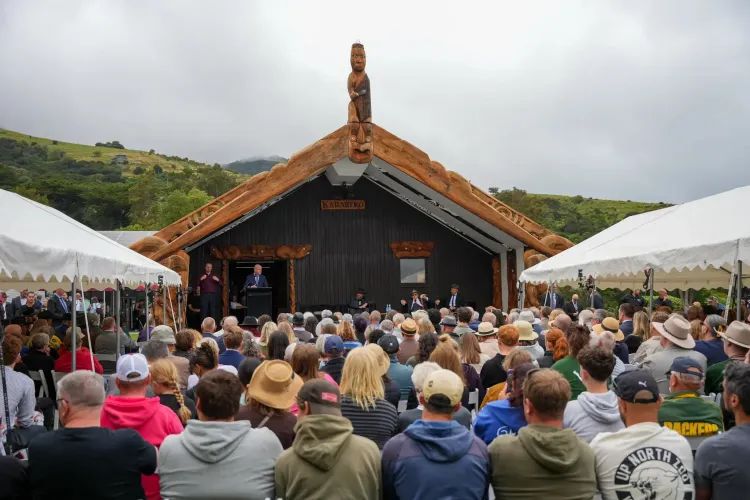New Zealand Commemorates 185 Years Since Treaty of Waitangi Signing

Synopsis
Key Takeaways
- New Zealand's Waitangi Day celebrates the signing of the Treaty of Waitangi.
- The treaty was signed on February 6, 1840, between the British Crown and Maori chiefs.
- Prime Minister Luxon highlighted the importance of honoring the treaty.
- Waitangi Day events included concerts and solidarity marches.
- Protests against the Treaty Principles Bill occurred prior to the celebrations.
Wellington, Feb 6 (NationPress) New Zealand celebrated Waitangi Day on Thursday, marking the 185th anniversary of the signing of the Treaty of Waitangi, a crucial document that established the nation's bicultural foundation.
This public holiday featured numerous events across the country, honoring the signing date of February 6, 1840, when the treaty was agreed upon by the British Crown and over 500 Maori chiefs, granting the British government exclusive rights to purchase land in New Zealand.
Prime Minister Christopher Luxon participated in festivities in Akaroa, located in New Zealand's South Island, rather than attending the main dawn ceremony, which included a traditional waka parade and kapa haka performance at the historic Waitangi Treaty Grounds in the Bay of Islands, North Island.
During his address, Luxon highlighted that Onuku Marae in Akaroa is the site where Ngai Tahu chiefs signed the Treaty of Waitangi 185 years prior, establishing a foundation intended to promote a lasting partnership.
Ngai Tahu is recognized as the primary Maori iwi (tribe) of the South Island, encompassing the largest tribal area in New Zealand.
Luxon remarked, 'As we reflect on the past and the remarkable journey of Ngai Tahu, we must also look forward toward 2040, the upcoming bicentenary of the treaty's signing.'
He emphasized, 'The treaty is fundamental to New Zealand's history and our future,' adding that the government must honor the treaty, collaborate with Maori, and foster a spirit of unity, togetherness, and solidarity.
This year's Waitangi Day festivities followed a wave of protests across the nation in November against the Treaty Principles Bill, which was introduced in parliament last year, aiming to revise and potentially undermine indigenous Maori rights, as reported by Xinhua news agency.
Events on Thursday also included two large concerts in Auckland, a solidarity march in the capital, Wellington, and a parade in Christchurch protesting the Treaty Principles Bill and current government policies.










